

How AI based Contract analysis software works? Top 5 ingredients of AI based Contract Analytics Platforms. There are several ways organizations deal with the contracting process.
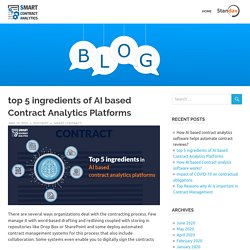
Few manage it with word-based drafting and redlining coupled with storing in repositories like Drop Box or SharePoint and some deploy automated contract management systems for this process that also include collaboration. Some systems even enable you to digitally sign the contracts However the most important ask for an organization with respect to contract management is to have instant visibility across their contract key terms to perform risk mitigation, understand which of their contracts deviate from standard terms, have control on third party contracts, get actionable insights across the contracts. How AI based contract analytics software helps automate contract reviews?
Contract review with in-house legal teams or external legal firms is common and, in most cases, organizations use standard vetted templates while entering a business relationship with customers or suppliers.
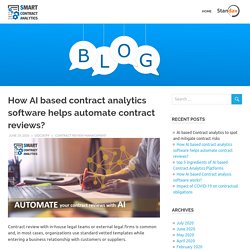
Organizations will use only the standard legally vetted contract templates when signing up with any vendor or customer but it is possible that standard contract templates of your organization are not accepted by the other party and in turn expect you to agree to their standard template. This is called as “accepting third party paper”. When you accept third party agreements here are some of the issues you are expected to encounter Introduction of new clauses that you do not expect to seeMinor to major changes in the language across the contract clausesTermination terms not in line with your expectationsContract is set to renew automatically after the completion of initial term What is the common process followed to understand these deviations?
How AI based Contract analysis software works? Impact of COVID-19 on contractual obligations. Every business around the world irrespective of location, size and nature of business has been deeply impacted with the unprecedented situation we are in with Covid-19.
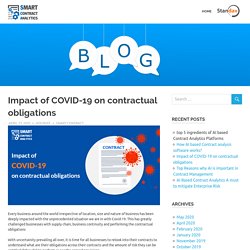
This has greatly challenged businesses with supply chain, business continuity and performing the contractual obligations With uncertainity prevailing all over, it is time for all businesses to relook into their contracts to understand what are their obligations across their contracts and the amount of risk they can be entitled if they fail to perform as per the agreed provisions. Typically all contracts have some sort of language that allows businesses to seek relief from performing the obligations or postpone or modify and it solely depends on the exact language used in the contract and what is covered. Contact – Smart Contract Analytics. Integrate your contracts with other CLM, Business systems. Better Contract Management with AI based Contract Analytics. Contract Analytics solution enhanced with AI and ML. Machine learning powered contract search, review and analytics. AI Based Contract Analytics A must to mitigate Enterprise Risk.
It is a known fact that the success of any organization is solely dependent on the volume of business they do in a fiscal year along with how they were able to effectively manage risks arising from the contracts they have signed with their vendors, customers, partners and employees To start with, lets understand the various ways an Enterprise can be exposed to potential risks regarding the contracts.
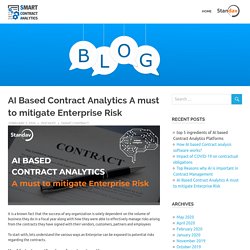
Unable to trace the signed contract on time Contracts are managed by various stake holders across the organization and several copies are rotated back and forth until the final contract is signed off by both parties. Most organizations who do not have a central repository of contract documents keep these signed contracts in several places that include Emails, Cloud storages like Google Drive, Drop box, file cabinets in case of paper based scanned documents, USB drives and so on.
Auto Renewal of a Vendor Agreement without notice Deviations from Standard Terms. Legacy Contract Migration & Document Analysis. How Organizations can improve Business Processes using AI? Enterprise Cognitive Computing is the use of AI in enhancing and scaling business operations for any company and any industry.
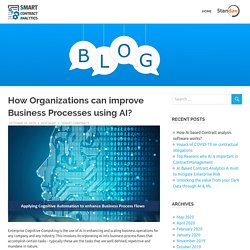
This involves incorporating AI into business process flows that accomplish certain tasks – typically these are the tasks that are well defined, repetitive and mundane in nature. For example, a cognitive automation process can help a mortgage loan officer to determine the loan eligibility of a borrower, which is a critical step in the home buying process and shortens the turnaround times. Typically, the borrower needs to submit pay stubs, employment letters, tax and bank statements and several other supporting documents by uploading into a loan portal or by submitting these via email. The following graphic illustrates this process at a high level: In the Healthcare industry, Revenue Cycle Management is a key business area that manages the insurance adjudication process and patient part of the pay. For more information about our AI & ML practice, please.
Changing the face of Contract Analytics using AI and ML. The world is going through a lot of advancements in technology and making a huge impact on how business is being conducted and how organizations are adapting to these new technologies.
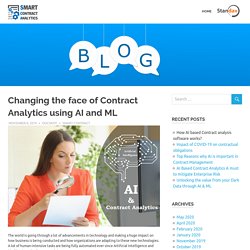
A lot of human-intensive tasks are being fully automated ever since Artificial Intelligence and Machine Learning have come into usage. we are seeing routine and mundane tasks being automated with the help of RPA (Robotic Process Automation), a lot of customer support functions getting automated with the help of Voice BOTS. It is not very far that we will witness wide usage of a Robot taking instructions from a recognized human voice and perform a business transaction on the fly. Still, Departments like Sales, Procurement, Legal, Human Resource across organizations who are constantly handling Customers, Vendors, Employees are not making full use of the latest technologies like AI and ML in solving their day to day business challenges.
Top Reasons why AI is important in Contract Management. Organizations across the world, depending on their nature of business will have contracts located across repositories and possibly in multiple languages.
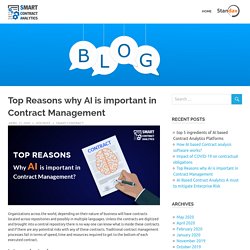
Unless the contracts are digitized and brought into a central repository there is no way one can know what is inside these contracts and if there are any potential risks with any of these contracts. Traditional contract management processes fail in terms of speed, time and resources required to get to the bottom of each executed contract. Let us understand a use case As a practical use case let us take an example of an organization that is into manufacturing of several spare parts of Automobiles and the organization has manufacturing facilities across the world spread across several countries. Obviously, such an organization will have to deal with multiple raw material vendors across the world and the organization must enter into agreements for supply of raw material with each of these vendors. What are the possible pain points?
Unlocking the value from your Dark Data through AI & ML. Gartner defines dark data as the information assets organizations collect, process and store during regular business activities, but generally fail to use for other purposes (for example, analytics, business relationships and direct monetizing).
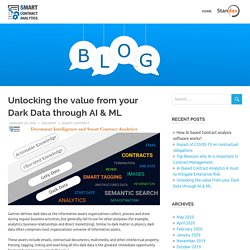
Similar to dark matter in physics, dark data often comprises most organizations’ universe of information assets. These assets include emails, contractual documents, multimedia, and other intellectual property. Parsing, tagging, linking and searching all this dark data is the greatest immediate opportunity for most businesses to unlock the value. With the advances in NLP and Machine learning, making sense out of this data and generating actionable insights to surface the risk, liabilities, and opportunities to renegotiate contractual terms is a low hanging fruit to prove the ROI of the AI initiatives in a company. It’s a good idea to enrich an organization’s data with external data sources that will help in creating new services. AI powered contract analytics and review.